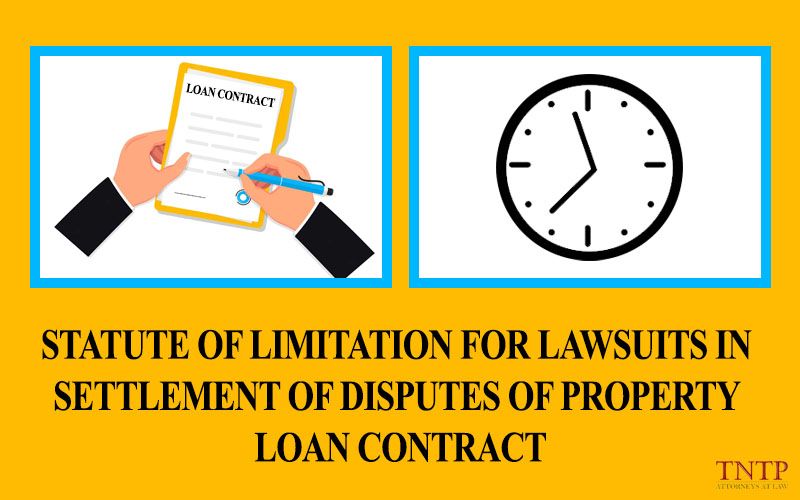Statute of limitation for lawsuits in settlement of disputes of property loan contract

During business or for other purposes where the borrower needs capital or finance to solve economic difficulties, signing a property loan contract is one of the ways to overcome that difficulty. The parties will agree and commit to the loan, the loan amount, the payment term, the interest on the loan within the due date and the interest on the overdue loan. However, in fact, in many cases, the borrower did not properly perform the payment obligation on time to the lender, even avoiding or delaying payment, affecting the statute of limitations for filing a lawsuit against the lender. So what is the statute of limitations for a lawsuit of property loan contract?
1. Overview of the statute of limitations for a lawsuit
- According to the provisions of Clause 3, Article 150 of the Civil Code (“Civil Code 2015”), the statute of limitations for a lawsuit is the time limit within which the subject is entitled to initiate a lawsuit to request the Court to settle the civil case to protect the infringed legitimate rights and interests; if that time limit expires, the right to sue is lost.
More specifically, for a general contract dispute, the statute of limitations for a lawsuit to request a Court to settle a contract dispute is 03 years from the date the claimant knows or must know his/her legal rights and interests are violated.
- It can be understood simply that when the payment term in the property loan contract has expired but the borrower has not yet paid the lender, then the legitimate rights and interests of the lender have been infringed and the statute of limitations for starting a loan has been violated. The event is calculated from the day after the date of the last payment period until 03 years later. However, it should be noted that the statute of limitations for lawsuit will only apply to the arising interest debt specified in the property loan contract (not applicable to the principal debt – the lawsuit to claim the property for the principal shall not be limited as for the interest).
2. How to deal with the expiration of the statute of limitations for a lawsuit against a property loan contract?
- In fact, for a variety of reasons, the lender allowed its statute of limitations to pass and end. Until the lender wants to sue to request the borrower to pay the principal and the interest arrears arising from the principal debt, the statute of limitations for lawsuit to claim the interest payment has expired. So how does the law protect the right to sue to request interest payment to the lender?
Pursuant to Article 157 of the Civil Code 2015 stipulating the restart of the statute of limitations for initiating a civil case:
“1. The statute of limitations for initiating a civil lawsuit begins again in the following cases:
a) The obligor has admitted part or all of its obligations towards the petitioner;
b) The obligor admits or partially fulfills its obligations towards the petitioner;
c) The parties have reconciled themselves with each other.
The statute of limitations for initiating a civil lawsuit begins again from the day following the date of occurrence of the event specified in Clause 1 of this Article.”
- Based on the experience of TNTP and the above provisions, although the statute of limitations for lawsuits has expired, in case the borrower confirms and acknowledges in writing that it will pay part or the whole of the loan amount of interest arising from a contract to the lender, the statute of limitations for initiating may be recalculated starting from the date following the event that the borrower’s written acknowledgment takes place.
The confirmation and acknowledgment of the obligation to pay interest debt to the lender can be expressed in the Minutes and signed by both parties; or
After the lender submits the Complaint to request the Court to settle, the borrower acknowledges the obligation to pay interest at the working sessions and is made a Minutes of testimony at the Court.
At that time, the statute of limitations for lawsuit will be recalculated and the lender can completely sue to ask the borrower to pay the interest incurred in addition to the principal debt.
Above are our analysis of the statute of limitations for lawsuits in the settlement of the disputes of a property loan contract, hope the article helps you.
Sincerely,



